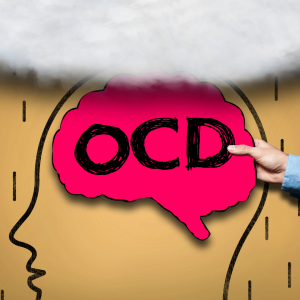Do you ever feel like you’re being watched? That someone is constantly monitoring your every move? If so, you might be suffering from obsessive-compulsive disorder or OCD. OCD is a mental illness that causes people to have intrusive thoughts and compulsive behaviors. In this blog post, we will discuss the science behind how OCD works and how it can be treated.
Contents
What Is OCD? 
Obsessive-compulsive disorder (OCD) is a mental health condition that causes people to have intrusive thoughts, feelings or urges (obsessions) that lead them to perform repetitive behaviors or rituals (compulsions). People with OCD often feel like they can’t control their thoughts or actions.
OCD can be a debilitating condition that interferes with everyday life. It can cause significant distress and impairment in social, occupational, or other important areas of functioning.
What Are The Warning Signs?
Obsessive-compulsive disorder (OCD) is an anxiety disorder characterized by intrusive thoughts that lead to repetitive behaviors. Common symptoms include excessive hand-washing, hoarding, and avoiding germs. People with OCD often have difficulty completing tasks due to their compulsions, which can take up a significant amount of time and energy.
Symptoms of OCD can be divided into two categories: obsessions and compulsions.
- Obsessions are unwanted, intrusive thoughts, images, or urges that cause distress or anxiety. Common obsessions include fear of contamination, need for symmetry or order, and intrusive sexual or violent thoughts.
- Compulsions are repetitive behaviors or mental acts that a person feels compelled to do to relieve anxiety or distress. Common compulsions include hand-washing, counting, and checking.
How Does OCD Work?
There’s no single answer to that question, as OCD can manifest in a variety of ways. But broadly speaking, OCD is thought to be caused by a combination of genetic and environmental factors.
Functional Impairment
There are four main ways in which OCD can result in functional impairment:
- Taking up a lot of time and energy: One of the most common ways OCD can functionally impair people is by taking up an excessively large amount of their time and energy. For example, someone with OCD might spend hours every day engaged in compulsive behaviors such as washing their hands, checking things, or reorganizing their belongings.
- Causing distress and anxiety: Another way OCD can functionally impair people is by causing a great deal of distress and anxiety. This can lead to avoidance behaviors, which in turn can interfere with work, school, or social activities. In addition, the anxiety caused by OCD can also hurt physical health.
- Causing problems in relationships: Finally, OCD can also cause problems in relationships. This is partly because OCD can take up so much time and energy, and can cause distress and anxiety. But it’s also because people with OCD often have difficulty accepting help from others, which can make it hard to develop and maintain close relationships.
As you can see then, there are many ways in which OCD can result in functional impairment.
Financial Problems
The most common way that OCD results in financial problems is through compulsive spending. This can take the form of buying things that are not needed or overspending on items that are needed.
For example, someone with OCD may feel the need to buy a new outfit every time they go out, even if they have nothing to wear. This can quickly lead to debt and financial difficulties. Other ways that OCD can result in financial problems include hoarding and compulsive gambling. Hoarding is often associated with OCD, as people with OCD may feel the need to keep everything “just in case” they need it later. This can lead to difficulty paying bills and other expenses, as well as creating a cluttered and chaotic home environment.
Social Isolation
OCD can result in social isolation for several reasons. One reason is that the obsessions and compulsions associated with OCD can take up a lot of time, energy, and attention, making it difficult to maintain relationships.
For example, someone with OCD might spend hours each day washing their hands or checking that doors are locked, which leaves little time for socializing. Additionally, people with OCD may avoid certain activities or places (e.g., public restrooms) out of fear of contracting germs or experiencing anxiety-provoking situations. This avoidance can further limit opportunities for social interaction.
Finally, the shame and embarrassment that often accompany OCD can lead to withdrawal from family and friends. People with OCD may feel like they are “crazy” or “weird,” which can make them reluctant to open up to others.
Strained Relationships
OCD can result in strained relationships for several reasons. One reason is that people with OCD often have difficulty communicating their needs and wants to others. This can lead to misunderstandings and conflict.
Additionally, people with OCD may withdraw from social activities and isolate themselves, which can damage relationships. Finally, the compulsions associated with OCD can take up a lot of time and energy, leaving little room for maintaining close personal relationships.
All of these factors can contribute to tension and stress in both personal and professional relationships.
Missed Opportunities
It’s not uncommon for people with OCD to spend so much time obsessing over their fears and compulsively performing rituals that they miss out on important opportunities in life.
For example, someone with a fear of germs may avoid going to job interviews or social gatherings because they’re afraid of coming into contact with germs. As a result, they may miss out on meeting new people, networking, or landing their dream job.
Another example is someone with OCD who spends hours every day compulsively checking the locks on their doors and windows. This can take away from time that could be spent with family, friends, or working on hobbies.
In severe cases, OCD can even lead to social isolation and agoraphobia (a fear of leaving home) due to which such people miss out on a lot of opportunities to live a fulfilling life such as going to college, getting married, or having children.
Low Self-Esteem
OCD can result in low self-esteem for a variety of reasons. One reason is that people with OCD often doubt themselves and their abilities. They may worry that they are not doing things correctly, or that they will make mistakes. This can lead to feelings of inadequacy and worthlessness.
Another reason why OCD can cause low self-esteem is because of the time and effort required to manage the condition. People with OCD often spend a lot of time and energy on rituals and avoidance behaviors. This can leave them feeling exhausted, both mentally and physically. As a result, they may have little energy left for other aspects of their life, such as work, school, or hobbies. This can lead to feelings of isolation and loneliness, as well as a sense of not being able to live up to their potential.
Finally, the stigma attached to OCD can also contribute to low self-esteem. People with OCD may feel like they are different from others, or that they are not worthy of love and acceptance. This can be especially difficult if they keep their condition hidden from others out of shame or fear of judgment.
Having Suicidal Thoughts
There are many ways that OCD can result in suicidal thoughts. One way is through the constant anxiety and fear that come with the disorder. People with OCD often live in a state of constant worry and fear, and this can lead to suicidal thoughts.
Another way that OCD can lead to suicidal thoughts is through the isolation that the disorder can cause. People with OCD often feel isolated and alone, and this can lead to feelings of hopelessness and despair.
Finally, people with OCD may also experience self-loathing and shame because of their disorder. These negative emotions can also lead to suicidal thoughts.
Problems With Alcohol Or Drug Abuse
People with OCD may turn to substances in an attempt to self-medicate their anxiety. They may also use substances as a way to cope with the stress of their compulsions. For example, someone with OCD who is afraid of germs may compulsively wash their hands until they are raw. This can be extremely stressful, and the person may turn to alcohol or drugs as a way to cope with this stress.
Additionally, people with OCD may engage in risky behaviors while under the influence of substances. For example, someone with OCD who is afraid of heights may take drugs or drink alcohol and then attempt to climb a tall building or cliff. These risky behaviors can result in serious injury or death.
How Can Therapies Help?
There are several different therapies that can help people manage and overcome OCD.
- One of the most common and effective is cognitive-behavioral therapy cognitive behavioral therapy. It works by helping people to understand how their thoughts, feelings, and behaviors are interconnected. It also teaches them how to change these patterns to improve their mental health.
- Other therapies that may be helpful for OCD include exposure and response prevention (ERP). It is a type of CBT that involves gradually exposing oneself to the things one fears while learning how to control their anxiety responses. This can be an extremely effective treatment for OCD, but it must be done under the supervision of a trained therapist.
- Family-based therapy involves working with a therapist to help improve communication and problem-solving skills within the family. This can be a very effective way to manage and overcome OCD, as it helps to create a supportive environment for the person with OCD.
Talk to your doctor or mental health professional about what treatment options are available. There is no one-size-fits-all approach to treating OCD, but with the right treatment plan, it is possible to manage and overcome this disorder.
What Are The Benefits?
There are various benefits of taking therapies for OCD such as:
- One of the benefits of therapies for the treatment of OCD is that they can help people to understand their condition and how it works. This understanding can be incredibly empowering and can help people to feel more in control of their lives.

- It can also help them to realize that their thoughts and behaviors are not really “crazy” or irrational, but are very common among people with OCD.
- Additionally, therapies can help people to learn how to effectively manage their OCD symptoms. This may involve learning how to challenge and reframe their thoughts, how to exposure and response prevention, and how to use relaxation techniques. These skills can be incredibly helpful in reducing the impact of OCD on a person’s life.
Finally, therapies can also provide support and encouragement. For many people with OCD, simply knowing that there are others out there who understand what they are going through can be a huge relief. Having someone to talk to who is supportive and non-judgmental can be invaluable.
How Can Self-Care Strategies Help?

There are a variety of different self-care strategies that can be effective in helping to recover from OCD, and it is important to find the ones that work best for you. Some self-care strategies that may help recover from OCD include:
- Exercise: Exercise has a wide range of benefits for mental health, and it can be particularly helpful for those dealing with OCD. It can also help to improve sleep quality and overall physical health.
- Mindfulness: Mindfulness meditation can help to focus the mind and allow people to become more aware of their thoughts and feelings. This can help manage OCD symptoms, as it can help to break the cycle of obsessive thoughts and behaviors.
- Doing what you love: Spending time doing things that you enjoy can help to reduce stress, improve mood, and increase overall happiness. For example, if you enjoy baking, spending time baking can be a great way to relax and take your mind off of your obsessions.
- Talking to your beloved: Talking to a loved one about your OCD can be helpful in several ways. It can help you to feel supported and understood, and it can also help to increase awareness of your thoughts and behaviors.
- Spend time with the needy: Helping others can be a great way to take your mind off of your problems and focus on something else. For example, volunteering at a local soup kitchen or animal shelter can be a great way to distract yourself from your obsessions and focus on helping others.
All of these self-care strategies can help recover from OCD. It is important to find the ones that work best for you and to stick with them.
Conclusion
OCD is a complex disorder that is not fully understood. If you or someone you know has OCD, it is important to seek professional help. There are many resources available to help people with OCD understand and manage their disorder. With proper treatment, people with OCD can lead full and productive lives.
Understand the importance of your precious life and don’t let OCD take control. You are not your OCD. Your worth is so much more than that. You are strong, you are brave and you can overcome this disorder.
The first step on your road to healing is to get assistance from a professional. You may go online and use Therapy Mantra to locate expert help in the privacy of your own home. Our specialists will assist you in resolving and overcoming your issue. You can schedule an online therapy session and talk directly with your assigned mentor through our free OCD treatment app on Android or iOS app.







